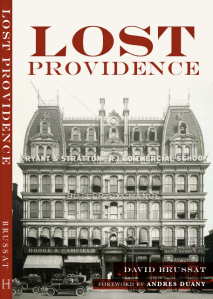That is a documentary film about the work of Jan Gehl, a Danish architect whose idea of “Life Between Buildings” encapsulates his desire, apparently, to undo some of the harm that modern planning and design have done to cities over the years. At least that’s what I take to be the matter at the heart of the film The Human Scale.
In the wake of my column about the meeting in Buffalo of the Congress for the New Urbanism, several people have expressed interest in my coming to see the film on Monday at 5:30. It will be shown by CNU New England – along with AIAri, APA of Rhode Island, and the Providence Foundation – at Aurora, in the Wit Building, which a while back was the stage for the Providence Black Repertory Comany, now alas defunct. Buff Chace recently bought the building and opened Aurora. The address is 276 Westminster Street. (I hope Don Powers, who will be there, has a copy of his firm’s design for the Wit Building in his back pocket.)
The screening will be followed by a panel discussion. I was warned that the evening was not about the buildings but the spaces between them. I appreciate the warning but I think those spaces are important, too. I plan to attend and hope for a lively discussion. With Steve Durkee, Don Powers and others on the panel, it should be lively. Steve considers himself a modernist, at least he used to, and Don specializes in buildings and places of traditional design. (Let’s you and him fight! Only kidding. Sorta.)
I think almost everyone agrees that something must be done about the spaces between the buildings in our modern (and mostly modernist) cities. Not everyone agrees that this must include more, and eventually much more, traditional design in the street walls that form the spaces between the buildings. I wonder which way, if any, this event, to the extent that it is being held with a purpose in mind, will want to take us.
A description of the film and the names of all of the panelists follows.
* * *
Special Screening of The Human Scale in Providence, Rhode Island
Monday, June 16th @ Aurora, 276 Westminster Street, Downtown ProvidenceDoors open at 5:30pm
CNU New England, in partnership with AIA Rhode Island, is pleased to announce a screening of The Human Scale and panel discussion in Providence, RI. Join us for a viewing of this important documentary film about the work of Danish architect Jan Gehl.
The viewing will be followed by an in-depth discussion about what Gehl’s human-centered message means for Providence. A panel featuring local planning and design experts will include:
– Russell Preston (Founder and Design Director, Principle Group) moderator
– Donald Powers (Founding Principal and President, Union Studio Architecture and Community Design)
– Steve Durkee (Senior Associate, Cornish Associates)
– William Dennis (Principal, B. Dennis Town & Building Design)
– Christine Malecki West (Principal, Kite Architects)When: June 16, 2014: 5:30 – 8:30PM
Where: Aurora, 276 Westminster St, Providence, RI 02903
How Much: CNU and AIA Members $10, Non-Members $15, Students $51.5 AIA CEUs available
2.5 AICP CMs pending approvalSpace is limited; sign up now!
About the film
The Human Scale questions our assumptions about modern cities, exploring what happens when we use a people-centered approach as the focus of city design. For 40 years, Danish architect Jan Gehl has systematically studied human behavior in cities. His starting point was an interest in people, more than buildings – in what he called “Life Between Buildings.” What made it exist? Why was it destroyed? How could it be brought back? This led to studies of how people use streets, how we walk, see, rest, meet, interact etc. Jan Gehl also uses statistics, but based on different questions: How many people pass this street in a 24 hour period? How many are pedestrians, how many are driving cars or bikes? How much street space is each allowed to use? Are our streets performing well for all users?
Gehl’s early research in Italy helped to transform the planning of Denmark’s capital, Copenhagen, for the past 40 years. His ideas inspired the creation of highly walkable streets, the expansion and improvement of cycling infrastructure, and the reorganization of parks, squares and other public spaces throughout Copenhagen and across the Nordic region. Today, cities like Melbourne, New York, Christchurch and Somerville are all taking notice of Gehl’s work that helped make Copenhagen the world’s happiest city.




There is no good urbanism without good architecture. Space between buildings is defined mostly by the buildings that make the space. Traditional and classical buildings make the best streets and spaces.
LikeLike